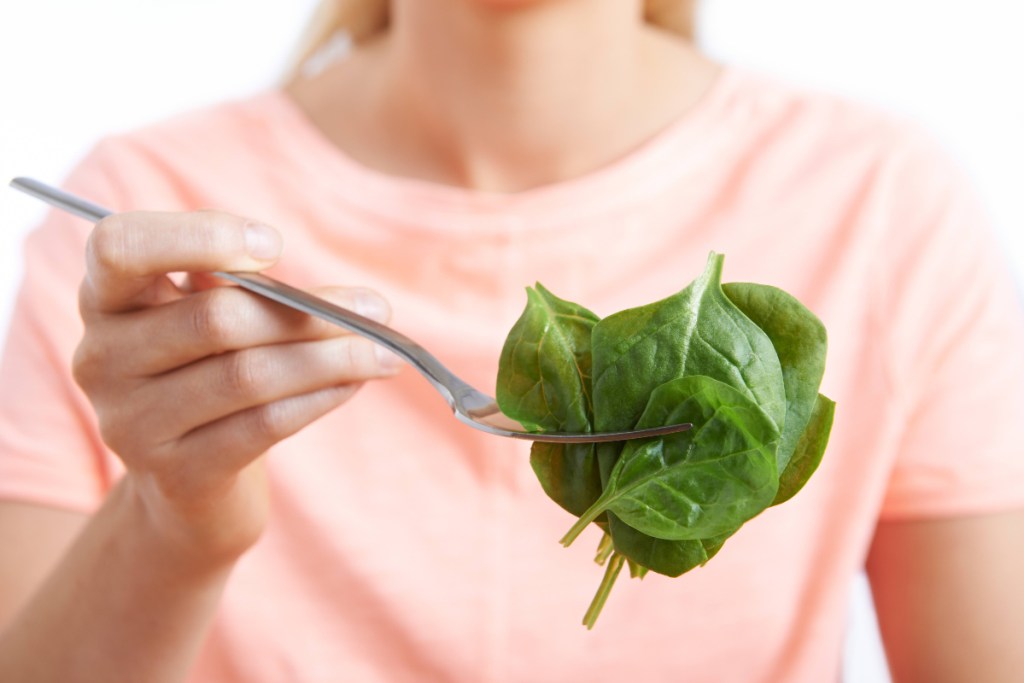Potassium is an important mineral and electrolyte, working to ensure your muscles function properly and your body retains its hydration. Some expert agencies recommend that adults consume between 2,000 and 3,000 mg of potassium per day to reap all the benefits. Unfortunately, as few as 2 percent of U.S. adults are getting enough potassium on a daily basis.
Even the banana, long considered the gold standard in this area, only contains about 420 milligrams of potassium. It’s a good start, but unless you eat them daily by the bunch, they can’t do the job alone.
This is especially challenging for those who follow certain diets or nutrition plans, like Keto, that restrict fruit intake because they are high in natural sugar. To make sure you’re getting your daily dose of special K, there are a host of fruits, vegetables, and legumes full of potassium. Mix and match to find the ones that fit your diet and lifestyle.

Vegetables
Spinach, 540 milligrams (1 cup): Seriously, what can’t spinach do? Popeye was a true thought leader. Spinach is known as one of the greatest of the superfoods, in part because of its high potassium content. An average salad will consist of about 1 cup of spinach, but it’s worth considering cooking your spinach as well. This vegetable, when cooked, releases more antioxidants than it does when raw.
Potatoes, 515 milligrams (1 potato): The humble potato is more than a conduit for ketchup. These spuds have a dense nutrient profile, including the elusive potassium.
Swiss chard, 960 milligrams (1 cup): This leafy green packs a massive potassium punch. While other power greens like kale and spinach tend to grab most of the shine among superfoods, Swiss chard deserves to be right alongside them, especially when considering potassium. Tired of salads? Saute your Swiss chard with garlic for a simple and delicious side dish.
Beets, 518 milligrams (1 cup): Beets are well known for their earthy flavor, beautiful coloring, culinary flexibility, and stacked nutrition profile. With more potassium than the average banana, beets are a strong addition to any diet plan, whether it’s on a salad, as a side, or cooked into delicious borscht.
Fruit
Banana, 422 milligrams (1 banana): To paraphrase Shakespeare, we didn’t come here to bury bananas but to praise them. They’re delicious, inexpensive, and highly versatile, all while containing significant amounts of potassium. Although bananas alone aren’t enough, they’re still a delicious and nutritious addition to plenty of health plans.
Avocado, 708 milligrams (1 cup): Avocados are loaded with heart-healthy monounsaturated fats and a range of vitamins and minerals. Plus this nutrient-dense fruit means that a dollop of guacamole can turn that plate of nachos from junk food into healthy food, at least a little bit.
Coconut water, 600 milligrams (1 cup): Forget those sugary sports drinks — coconut water is one of the most hydrating beverages in the world. It also has a lower sugar content than most juices and similar drinks. One serving is also packed with potassium, ensuring your hydration lasts.
Pomegranate, 666 milligrams (1 pomegranate): This tart fruit is a fan-favorite because these sweet-and-tangy seeds have a stocked nutrition profile. Not many fruits (or vegetables, for that matter) can hold a candle to the powerful potassium punch of one pomegranate.

Legumes
White beans, 829 milligrams (1 cup): Want a secret weapon in the fight to increase your potassium? Look no further than the humble bean. White beans contain some of the most potassium on this list, serving for serving, and will make a versatile and tasty addition to your everyday diet.
Black beans, 611 milligrams (1 cup): Black beans are a well-known superfood but tend to receive praise because they are high in fiber and promote gut health. That’s all terrific of course, but they also contain about a quarter of your daily potassium needs.
Edamame, 676 milligrams (1 cup): This popular snack is as simple as it gets: just steam and sprinkle with salt for an easy side that’s also a great source of potassium. But don’t stop at the appetizer stage; plenty of soy products such as tofu (300 milligrams per cup) and tempeh (684 milligrams per cup) are also potassium powerhouses.
This list is not intended to be exhaustive, but all these foods will help you reach your daily potassium threshold. It may require some work, but your body and your taste buds will thank you.
BlissMark provides information regarding health, wellness, and beauty. The information within this article is not intended to be medical advice. Before starting any diet or exercise routine, consult your physician. If you don’t have a primary care physician, the United States Health & Human Services department has a free online tool that can help you locate a clinic in your area. We are not medical professionals, have not verified or vetted any programs, and in no way intend our content to be anything more than informative and inspiring.




